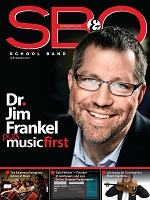For those who have never done it, the idea of applying for and writing a grant can be daunting and intimidating all of that paperwork, writing, and valuable time spent. How does one convince an organization that their program is a worthy investment of time and money? Should the grant writer take a cerebral approach to the process or should they poignantly display their passion for the program in need? What about the applicant pool with so many music programs currently in jeopardy, how does a program get noticed and awarded among so many others? To answer these questions and to get an idea of what organizations look for when allocating grants, CD did some research and called upon a grant-giving professional for some insider tips.
Executive director of the Fender Music Foundation, Moriah Harris-Rodger, is an expert on the grant-writing process. Looking over various grant opportunities and applications, the most common thread found in all of them is proof of sustainability. “Proof of sustainability is a huge part of a grant application,” says Harris-Rodger. “A lot people try to start music programs, and, unfortunately, it is a huge undertaking that is often miscalculated. It’s hard to keep a music program going for very long without a lot of planning and preparation. We want to award a grant to a program that is able to exist for at least for the life of the instruments we’re giving.”
This is important because often times the person applying for the grant is not associated with a school district. As Moriah explains, “So many school music programs are struggling right now and that means that a lot of parents are paying for the supplies. If they can’t make it work, the schools lose their music programs. When this happens, the community may step in, and someone will start a music program if the school does not have one. These people need help with funding, and we have been seeing this situation more and more in our grant applications.”
The Fender Music Foundation grants fall into three different categories: school music classrooms, after-school music programs (usually community-based), and music therapy.
If you’ve decided that you want to apply for a grant. The next step finding that granting agency that best matches your program and needs. The easiest and most inexpensive (free) way to find the right grant opportunities is by searching the Internet. The best places to search are the federal government, state governments, foundations, or a business, as these are the top granting entities. Grant writing seminars may be helpful, but the cost may be prohibitive. These seminars cost, on average, anywhere from $400 to $700 for a two to three-day workshop. Grant writing seminars are held all over the country and are hosted by various enterprises, including the federal government.
If you have found the grant that you are looking for, now is the time to take the opportunity to learn from others’ oversights and gaffes in the grant writing process.
According to Harris-Rodger, one of the most common mistakes is when the applicant makes assumptions about what the Fender Foundation wants to hear. For example, because they are connected to Fender, applicants may think that they should say how much they love Fender, or what a great advertising opportunity this is for Fender. “That’s not what we’re about,” Moriah explains. “We are not a corporation we are a non-profit. We are about more people making music. We care how these programs are being structured. How are they getting their funding? Do those funding sources look sustainable? So, if an applicant is going to make any assumptions about the organization they are applying to, at least base it on organization’s mission statement.” The time-honored advice often given to writers to “know you topic and your audience,” certainly applies to grant writing, too.
As silly as it may sound, you not only have to know your topic, but you have to be in love with it. “From the perspective of the grant maker,” Moriah conitues, “we want to be inspired. If you don’t care about what you’re writing about, don’t use language that conveys how important this is to you, and we can’t see your passion, it is less likely that we will hand over a grant. That’s why applications are stronger when they’re filled out by the person doing the program the music director or the teacher. The ones that are filled out by people who write grants professionally are often not as strong. There’s a degree of separation.” For those of you who are not professional grant writers, this is great news!
Lastly, gather support. The grant writing process can go much more smoothly with the help and support from peers. Networking and reaching out to educators who have been awarded grants is a great way to get advice and support. Social networking sites can be a great way to reach out to other educators. As Harris-Rodger says, “It’s important to learn from each other and not look at other music educators as competitors. In the end, we all want more people making music, and we all have to work together to get there.”




















